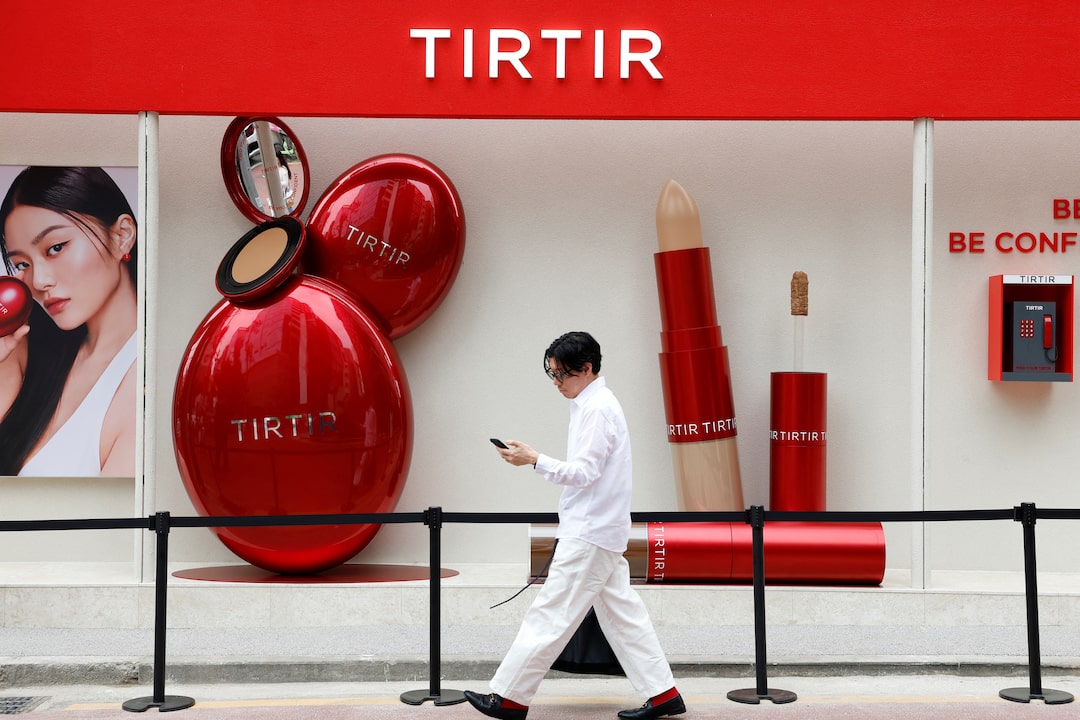A man walks past a TIRTIR store in Seoul, South Korea, May 23, 2025. REUTERS

Women check out cosmetic products of TIRTIR at its store in Seoul, South Korea, May 23, 2025. REUTERS

Foreign tourists shop at an Olive Young store in Seoul, South Korea, April 28, 2025. REUTERS

Jin Se-hoon, Executive Vice President at Olive Young, poses for photographs before an interview with Reuters in Seoul, South Korea, April 28, 2025. REUTERS
SEOUL, June 5 (Reuters) – Emboldened by roaring online success in the U.S., South Korea’s cosmetic startups are expanding their bricks-and-mortar presence in the world’s biggest consumer market, confident their mass appeal will offset the hit from tariffs.
Brands like Tirtir, d’Alba, Torriden, and Beauty of Joseon are in talks with major retailers to stock their U.S. shelves, company executives have told Reuters.Korean beauty, or “K-beauty”, products are able to compete globally on quality, price and snappy marketing and have benefited greatly from the success of the Asian export giant’s other consumer hits, namely its music, film and television.
“K-culture — things like PSY in the past, BTS, and then Korean dramas and films like ‘Parasite’ — those really paved the way,” Tirtir CEO An Byung-Jun said.
“In the U.S. market, there was already growing interest in South Korea. Then Korean cosmetics entered the scene. The quality was good, but the prices were lower than the existing luxury brands like L’Oreal or Estee Lauder.”
Tirtir’s profile shot up last year following the viral online success of its cushion foundation shades designed for dark skin. The product will be sold at some U.S. stores of Ulta Beauty this summer, An told Reuters, adding it aims to double U.S. sales this year.
Retailers in the U.S. from Sephora and Ulta Beauty to Costco and Target are in talks with Korean cosmetics brands to launch sales in their physical stores, according to Reuters’ interviews with a dozen people including cosmetics company CEOs, executives and industry experts.
They also expect Korean brands to weather tariffs better than rivals, thanks to higher margin business models. Many of them outsource production to contract manufacturers like Cosmax and Kolmar, dubbed the Foxconns of fast beauty, to keep costs down.
South Korea overtook Germany to become the world’s third-largest beauty product exporter after France and the U.S. in 2024. Four fifths of its $13 billion cosmetics output are for exports, which have predominantly been driven by e-commerce sales.
Yuliet Mendosa, a 25-year-old visiting Seoul from America, is a fan of K-pop boy band BTS, which led her to greater interest in K-beauty products.
“They go straight to the point to fix what you need to fix and your skin,” she said at an Olive Young store.
CHANGING LANDSCAPE
The U.S. push comes at a tricky time for the world’s big exporters with President Donald Trump’s sweeping tariffs unsettling global trade.
But while the levies create uncertainty for Korea’s beauty exporters, strong demand is expected to mitigate some of this, executives say.
South Korea’s dominant beauty retailer Olive Young plans to set up its first U.S. store in Los Angeles as early as this year, Jin Se-hoon, Executive Vice President of the company’s global platform business, told Reuters.
“The U.S., especially California, has by far the most customers for our global online shopping platform,” Jin said.
He said Washington’s tariffs were a burden but not enough to hurt K-beauty’s popularity and value-for-money proposition.
Their U.S. expansion, despite tariffs, also seeks to sustain momentum after exports to China, the biggest overseas market for K-beauty, fell due to geopolitical tensions and competition.
Skincare brand d’Alba, owned by d’Alba Global and known for its vegan mist serum and sunscreens, is in talks with Costco, Ulta Beauty and Target for retail distribution, the company said.
LVMH’s cosmetics chain Sephora plans to launch two new Korean brands Torriden and Beauty of Joseon this summer, according to a Sephora spokesperson.
Costco, Target and Ulta did not respond to requests for comments.
Tirtir’s An said the baseline 10% tariff that the U.S. has already imposed is “endurable” although the planned 25% tariff on South Korean products due in July may force the company to raise prices “a little bit.”
Seoul, a major U.S. ally, is seeking tariff exemptions in trade talks with Washington.
The Founders–the maker of Anua skincare products, which hit Ulta Beauty shelves this year–also have more room to absorb higher tariffs than rivals, its strategy team leader Jung Jun-ho said. The company posted an operating profit margin of over 30% last year.
NICHE BRANDS
South Korea replaced France as the biggest cosmetics exporter to the U.S. in 2024, according to official data, driven by online sales through Amazon.
The top five Korean cosmetics brands in U.S. e-commerce–which include Beauty of Joseon, Medicube and Biodance–saw online sales grow 71% on average over the past two years, outperforming the overall U.S. market’s 21% growth, according to Euromonitor data.
The top five French brands–which include L’Oreal Paris, Dior and Lancome–posted 15% growth over that period.
Social media has played a big part in Korea’s success.
“Nowadays a single viral TikTok video or influencer endorsement can turn a product into a global bestseller before it even launches outside Korea,” said South Korea-based beauty marketer Odile Monod.
But longer-term success will require increased physical store sales, said Jason Kim, CEO of cosmetics distributor Silicon2.
There are already signs of growth plateauing for some companies, such as startup COSRX, now part of Korean cosmetics giant AmorePacific as competition heats up and cheaper alternatives emerge, analysts said.
For now, investors remain upbeat about Korean potential, with shares of d’Alba Global more than doubling since their debut last month.
“The K-beauty trend is strong,” Silicon2’s Kim said. “But indie brands will face challenges too.”
Reporting by Hyunsu Yim and Hyunjoo Jin; Editing by Miyoung Kim





